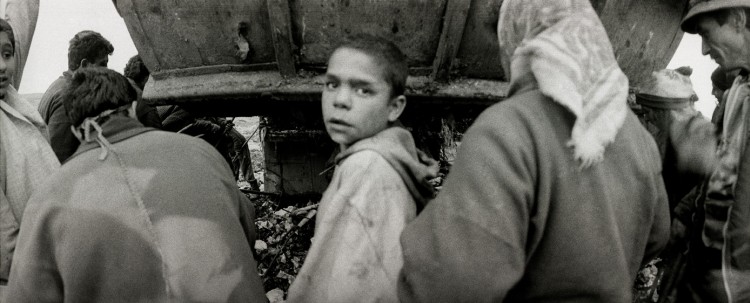
The Romanian Roma community is the world's largest. Amongst Romania's 23 million inhabitants the government estimates it's Roma population aas being 400,000, but a more realistic figure would be around 2 million. Following the 1989 december revolution many Roma villages were torched and levelled by angry mobs whilst the local authorities turned a blind eye. The population's ever increasing anti-Roma feelings are attributed to Romania's economic situation where the average monthly salary is 100$.
Ceaucescu's policy during his 22 year dictatorship was to settle the Roma by force, giving them housing and manual work in community farms and factories. Today, following the socio-economic reforms brought on by the collapse of Ceaucescu's regime, hundreds of thousands of Roma have found themselves once again in the street, this time without any traditional means of survival.
Today a handfull of Roma occupy jobs shunned by Romanians : rubbish collection, road works or sweeping streets. For all the other "un-employed" Roma their only option is to sell recycled goods (paper, cardboard, metal, glass) found in dustbins or more often than not on municipal rubbish dumps. Seven days a week, night and day, men, women and children sift through tonnes of rubbish poured out an army of trucks. The work carried out by the children combined with the social benefit that each family is entitled to for their children's education represent an important source of income ; important enough for many Roma to have as many children as possible.
The 50 families that comprise the Dallas community survive exclusively from what they find on Cluj Napoca's municipal rubbish dump. Dallas got its name from the american television series because of the numerous love intrigues and internal disputes and also because this slum's poverty and misery could not be further from the serie's opulence.
"If I had a lot of money I could buy a pig, if I had loads of money I could buy two."
Ciprian Lacatus, 13 years old.

Cluj’s municipal rubbish dump, february 1998. Cipriani and his two younger brothers work day and night on the dump. They sleep outside, kept warm by burning tyres and huddling up together with the other 23 children. Due to temperatures that drop to below 10°C they only mange to sleep a maximum of 2 hours a night.